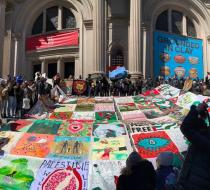‘Met Museum, you’re complicit’: artists and activists take over museum’s front steps with giant pro-Palestine quilt Favorite
A two-hour rally at the New York museum drew many supportive cheers and honks, plus a handful of antagonistic shouts
Benjamin Sutton
25 March 2024
Hundreds of artists, cultural workers and activists gathered on the steps of the Metropolitan Museum of Art on Fifth Avenue in New York on Sunday (24 March), demanding that the most visited museum in the US publicly call for a ceasefire in the war in Gaza and commit to preserving Palestinian cultural heritage. The protesters unfurled a 30ft by 50ft collaborative quilt featuring sewn, painted and printed designs by more than 60 artists expressing solidarity with Palestinians.
The quilt was organised by an international group of artists who were inspired by the Names Project Aids Memorial Quilt, which began as a memorial to US victims of HIV and Aids in 1987 and continues today. The pro-Palestine quilt’s panels, most of which feature the red, green and black of the country’s flag, vary widely in style and tone, from references to Pablo Picasso’s Guernica (1937) and the Jenin Horse sculpture in the West Bank to iconography like poppies, doves, pomegranates, watermelons and more. Some render scenes of violence and trauma, with parents shielding their children.
Protesters at the Metropolitan Museum of Art on 24 March hold a pro-Palestine quilt created by the group Hope in the Art World
Benjamin Sutton
“The images that keep sticking in my mind are of parents holding their children, siblings holding each other—people protecting their loved ones and begging for help,” says Sara Erenthal, a Brooklyn-based artist who contributed to the quilt. Her square features two stylised figures crying and raising their hands in need. “As a Jewish person it’s important that I lend my voice to this cause.”
Rebecca Goyette, a Brooklyn-based artist, curator and educator who helped organise the quilt project, said it was partly inspired by the participants’ experiences of censorship in the art world—where expressions of solidarity with Palestine or criticisms of the Israeli government are often misconstrued as antisemitism.
“A lot of the artists in the group were losing sales, losing opportunities, having shows cancelled anytime they made public statements calling for ceasefire,” Goyette says. “We can’t lose our ability to be vocal and to take a stand for Palestine.” The group is selling prints based on the quilt squares, with all proceeds going to the United Nations Relief and Works Agency (Unrwa).
Members of the group Incite NYC lead a performance song and dance during the 24 March pro-Palestine protest at the Metropolitan Museum of Art in New York
Benjamin Sutton
In addition to the quilt, protesters held signs with messages like “cease genocide” and “liberate the museums”, chanting slogans including “Met Museum, you’re complicit, kids are dying every minute” and “not another nickel, not another dime, no more money for Israel’s crimes”. Participants also recited poetry, sang, played instruments and danced while dozens of New York Police Department officers and Met security staff kept watch. One speaker praised the more than 150 employees of the museum who have signed an open letter urging its director and chief executive Max Hollein to “take a stand in defence of Palestinians and the cultural heritage of Palestine”. A spokesperson for the museum declined to comment on the protest.
While many museumgoers and passersby appeared supportive, a handful made obscene gestures at the crowd or yelled competing messages. “Free the hostages,” one man shouted in reference to the 100 or so Israeli hostages taken by Hamas on 7 October who are still being held in Gaza; the crowd retorted: “Yes, free everyone!”
Pamphlets created for the 24 March protest, in the style of the Met's official materials, urge readers to "Dump the fine art of imperialism"
Benjamin Sutton
Pamphlets the activists distributed outside the museum and inside its Great Hall outlined the goals of the protest and called on the institution to cut ties with three longtime supporters they see as being complicit in the current crisis in Gaza. They include the cosmetics mogul, Neue Galerie founder and World Jewish Congress president Ronald Lauder (who “has been key to promoting the conflation of anti-Zionism with antisemitism”, according to the pamphlet), Morgan Stanley chief executive Edward Pick (whose company holds more than $3bn of stock in the arms and aerospace company Raytheon Technologies, which has benefited from US military support of Israel) and Michael Steinhardt—a collector who has surrendered more than 100 stolen antiquities, more than 20 of which are said to have come from the West Bank, according to the pamphlet.
According to the local health ministry more than 32,000 Palestinians have been killed since Israel launched its invasion of the Gaza Strip in the immediate aftermath of Hamas’s 7 October terror attack on Israel, in which around 1,200 people were killed and more than 200 were taken hostage. (Within hours of the protest, a temporary ceasefire deal and agreement to trade Israeli hostages for Palestinian prisoners appeared to become a real possibility for the first time in months.)







